A Word to the Orthodox Brothers and Sisters Who Signed the Statement on the 70th Anniversary of the So-Called “Lviv Sobor of 1946”
Tuesday, 29 March 2016, 10:38 We, Greco-Catholic bishops, clergy, and lay people, scholars and researchers from various countries, express our sincere gratitude and recognition for your letter in which you rightly call this gathering a “pseudo-synod.”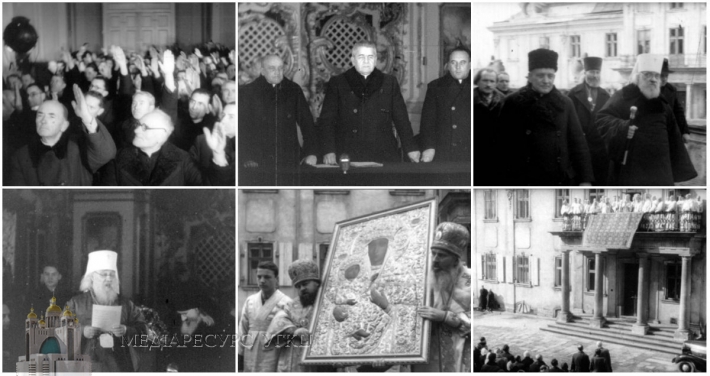
-
See also:
- Ecumenical Prayer Service on the occasion of Week of Prayer for Christian Unity held in Kyiv
- We want to implement universal benefits of ecumenical dialogue on the Ukrainian level, - Head of the UGCC at Sofia Kyivska
- Was the so-called Lviv sobor of 1946 really a church council?
You call upon the Orthodox hierarchy in Russia and Ukraine to “recognize the invalidity of the tragic decisions” and assure the Ukrainian Greco-Catholic Church (UGCC) of your solidarity and prayer “for all the innocent victims of this Church who were imprisoned, tortured, deported and assassinated by the Soviet government with the complicity of the Patriarchate of Moscow.”
The Lord is the God of peace, and therefore a sense of earthly peace gives us a vivid foretaste of the Kingdom of Heaven. When we reconcile with one another, it can be said that we confirm the continuing power of Christ’s words: “So if you are offering your gift at the altar, and there remember that your brother has something against you, leave your gift there before the altar and go; first be reconciled to your brother, and then come and offer your gift” (Matt 5:23–24). This year your Easter gift will be dear to the Lord. We hope that He also gives us His mercy.
We sincerely admire your courage, because it is difficult to be the first — and it is even harder to remain alone. One can always encounter suspicion and mistrust from the other side and misunderstanding and lack of support from one’s own. We are convinced that your Appeal reflects the true opinion and convictions of many Orthodox throughout the world. So today we remember with gratitude all those individual expressions of compassion, understanding, and solidarity with the Church that was condemned to silence; these expressions resounded throughout all the previous decades and still sound today. Almost simultaneously with your Appeal, the Press Centre of the Ukrainian Orthodox Church (Kyivan Patriarchate) said that they “share the grief of the Ukrainian Greco-Catholics through the suffering and loss that they suffered as a result of Soviet repressions.” Both of these initiatives appeared within the context of the recent pursuit of Eucharistic unity between Orthodox and Greco-Catholics, which began last year at the proposal of the Sobor of the Kharkiv-Poltava Eparchy of the renewed Ukrainian Autocephalous Orthodox Church.
Our answer can best to put into words as: “We forgive and ask forgiveness.” These were the same words with which exactly 50 years ago Polish bishops appealed to German bishops, and which have since become the main formula of the European culture of understanding. In the Ukrainian Greco-Catholic Church, this formula was first heard in 1987 from the then head of the Church, Cardinal Myroslav Ivan Lubachivsky, and confirmed on various occasions by the Church’s subsequent primates.
Of course, it is hard not to notice that the official position of the Church that was an instrument of persecution of the Greco-Catholics in the hands of the godless totalitarian regime is still a position of overt reluctance to accept the facts and of denial regarding historical reality. The history of the persecution of the UGCC continues to be falsified following the example of Stalinist secret directives and becomes an instrument of neo-imperial ideological propaganda, and even of a hybrid war waged on the territory of Ukraine by those who build their so-called “Russian World” (“Russkiy mir”) by assuming a monopoly as the sole voice of “Orthodox civilization.” The world of true civilization, however, cannot be built on hatred, violence, and a distortion of historical truth; such a pseudo-civilization, such a pseudo-world, has no future. Let all those who succumb to the temptation to replace the internal truth by external force remember this.
However, we know that “God’s mills grind slowly,” and for this reason we believe that false ideological constructions will sooner or later fall. The power of Christ did not depend on whether He had the backing of the government or political influence, but rather His power came from the fact that He sowed the Word of eternal life and testified to the Truth. Inspired by the example of our Saviour, we hope and believe that your Appeal will be the mustard seed of the Gospel that grows exceedingly. It opens up the possibility in the near future for Orthodox and Greco-Catholics to realize that for which we pray every year in the stichera of the Easter services: “The day of Resurrection; let us be radiant for the festival, and let us embrace one another. Let us say, brethren…”
Nevertheless, we cannot move forward with a head facing backwards. Our relations are marked by centuries of bitter religious polemics and the still fresh conflicts of recent decades — conflicts that divided communities and even individual families. Today we must once and for all abandon this style and way of explaining our relationships, leaving the past to historians and to almighty God, Who is the best healer of our minds and hearts. Talking about the past should take place in a calm and friendly atmosphere of mutual search for the objective truth, on the basis of scholarly methodology, academic honesty, and responsibility. But the ultimate goal of such a dialogue should not be mere clarification of historical truth. We are called to a greater goal — the unity of Christ’s Church.
In the past, each side sinned by seeking not necessarily true unity in love, but rather an absorption of the other side into itself, while the other was treated not as a community of brothers and sisters in Christ, but as an adversary, sometimes even as an enemy. Such absorption was disguised as a “reunification,” and was, in fact, nothing but the ill-famed “uniatism” that both Catholics and Orthodox condemned as an inappropriate method for Church union. Our communities have gone down their own historical paths and have different experiences of Church life. Until now it was the cause of our conflict, but it may in fact become the basis for our mutual enrichment. Let this be our pledge of brotherly love and unity that Christ commanded us. By adhering to this unity, we are to witness to the world the essence of our faith and fidelity to our common tradition.
Orthodox brothers and sisters, your letter helped us to transcend our pain and experience this sad anniversary of the pseudo-sobor with a sense of hope. We hope that our mutual appeals, to which our other co-religionists are free to join, will be the foundation for our future work together. May the Holy Spirit heal our historical wounds and guide us toward forgiveness, reconciliation, and true union in Christ, who by His resurrection conquers death and gives us all hope for eternal life.
Kyiv, 17 March 2016
On behalf of the participants of the International Conference “The Power of Faith Against the Violence of Authorities: Greek Catholics in Central and Eastern Europe in the Context of Persecution by Totalitarian Regimes after the Second World War” held at the Taras Shevchenko National University of Kyiv on 17 March 2016, and researchers of this issue:
+ Sviatoslav (Shevchuk), Head of the Ukrainian Greek Catholic Church, Kyiv
+ Bohdan (Dziurakh), Secretary of the Synod of Bishops of the Ukrainian Greek Catholic Church, Kyiv
+ Borys (Gudziak), Eparch of the Ukrainian Catholic Eparchy of Sant Volodymyr the Great of Paris
+ Vasyl (Tuchapets), Exarch of Kharkiv of the Ukrainian Greek Catholic Church, Kharkiv
Fr. Bohdan Prah, Rector of the Ukrainian Catholic University (UCU), Lviv
Fr. Iwan Dacko, President of the Institute of Ecumenical Studies at UCU, Lviv
Myroslav Marynovych, President of the Institute of Religion and Society of UCU, Lviv
Oleh Turiy, Chair of Church History at UCU, Lviv
Volodymyr Tylishchak, Vice-Director of the Ukrainian Institute of National Remembrance, Kyiv
Fr. Peter Šturák, Dean of the Greek Catholic Theological Faculty of the University of Prešov, Slovakia
Fr. Yury P. Avvakumov, Professor of Historical Theology of the University of Notre Dame, USA
Igor Hałagida, Professor of the University of Gdańsk, Poland
Fr. Andriy Mykhaleyko, Visiting Professor of Church History, Catholic University of Eichstätt/Ingolstadt, Germany
Svitlana Hurkina, Director of the Institute of Church History at UCU, Lviv
Daniel Galadza, Post-Doctoral Assistant, Institute of Historical Theology, University of Vienna, Austria
Fr. Taras Bublyk, Researcher at the Institute of Church History at UCU, Lviv
Volodymyr Moroz, Religious Studies, Ternopil
Iryna Fenno, Assistant of the Department of Religious Studies of the Taras Shevchenko National University of Kyiv
Olga Zbrozhko, Researcher of the Center for Research of the Liberation Movement, Lviv
Anatoly Babinski, Editor of the journal “Patriarkhat”, Lviv
John Reves, Deacon UGCC, Center for Eastern Christian Spirituality "Byzantinisches Gebetszentrum", Salzburg, Austria
Wasyl Bilinsky, Ukrainian Greek Catholic Priest Folsom, Louisiana USA
Roman V. Russo, Priest: Russian Greek-Catholic, New York City, USA
Tamás Véghseő, Rector, St Athanasius Greek-catholic Theological Institute, Nyíregyháza, Hungary
Katarzyna Smyk, Student, Kraków, Polska
Jeffrey Stephaniuk, Parish Priest, Eparchy of Saskatoon, Wynyard, Saskatchewan Canada
Br. Maximos Macias, Professor - Monk, Ponce, Puerto Rico
Myroslaw Futala, business owner, Huntsville, Alabama, US
Melita Mudri-Zubacz, Music Professor, Fresno, California, USA
Mark Hartman, El Cajon, California
J. Glenn Campbell, Retired, Sacramento, California
Giovanni Codevilla, Professor of Comparative Ecclesiastical Law, Milan, Italy
Richard Janowicz, Greek Catholic priest Springfield, Oregon, USA
Catherine Rakchaev (Arakcheeyv), Retired Nurse, Mundare, Alberta, Canada
Hieromonk Teodosy, Myrnam, Alberta, Kanada
V. Rev. Marijan Procyk, Pastor of St. Nicholas, Buffalo, New York, USA
…
You can add your name as a signatory of this document by following this link: docs.google.com
We can imagine what the prayer of the prisoners in the Russian torture centers in the Ukrainian Kharkiv region was like – Head of the UGCC on the 206th day of the war 17 September
A vast cemetery, a mass burial, was found near the city of Izyum, in which more than 400 innocently killed and tortured people have already been...
-
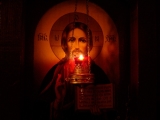 Глава УГКЦ у 158-й день війни: «Нехай Господь прийме з уст нашої Церкви псалми та моління за всіх тих, які особливо просять нашої молитви»
Глава УГКЦ у 158-й день війни: «Нехай Господь прийме з уст нашої Церкви псалми та моління за всіх тих, які особливо просять нашої молитви»
-
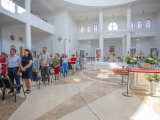 «Сила, яка походить із вірності Христові, є стержнем, який ніхто не може зламати», – Блаженніший Святослав
«Сила, яка походить із вірності Христові, є стержнем, який ніхто не може зламати», – Блаженніший Святослав
-
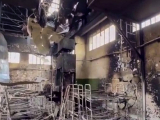 Глава УГКЦ у 157-й день війни: «В ім’я Боже ми засуджуємо звірства в Оленівці і світ повинен це засудити як особливий вияв дикості й жорстокості»
Глава УГКЦ у 157-й день війни: «В ім’я Боже ми засуджуємо звірства в Оленівці і світ повинен це засудити як особливий вияв дикості й жорстокості»
-
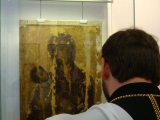 «Боже, почуй наш плач і поспіши нам на допомогу і порятунок!», – Глава УГКЦ у 156-й день війни
«Боже, почуй наш плач і поспіши нам на допомогу і порятунок!», – Глава УГКЦ у 156-й день війни
-
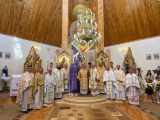 «Бог йому дав серце і душу українського народу»: відбулася щорічна проща до Прилбичів з нагоди уродин митрополита Андрея Шептицького
«Бог йому дав серце і душу українського народу»: відбулася щорічна проща до Прилбичів з нагоди уродин митрополита Андрея Шептицького
-
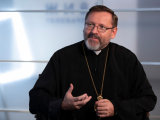 Глава УГКЦ: «Я горджуся українськими патріотами, які без найменшої краплі ненависті готові захищати своє»
Глава УГКЦ: «Я горджуся українськими патріотами, які без найменшої краплі ненависті готові захищати своє»
-
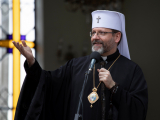 Блаженніший Святослав закликав українську молодь скласти присягу на вірність Христові
Блаженніший Святослав закликав українську молодь скласти присягу на вірність Христові
-
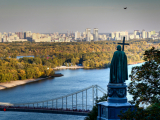 Глава УГКЦ у 155-й день війни: «Помолімося, щоб не втратити скарбу віри князя Володимира»
Глава УГКЦ у 155-й день війни: «Помолімося, щоб не втратити скарбу віри князя Володимира»
-
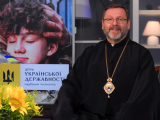 Блаженніший Святослав у День державності України: «Наша Держава – це для нас питання життя або смерті»
Блаженніший Святослав у День державності України: «Наша Держава – це для нас питання життя або смерті»
-
 Глава УГКЦ у 154-й день війни: «Нехай Господь Бог прийме у свої вічні обійми журналістів, які віддали за правду своє життя в Україні»
Глава УГКЦ у 154-й день війни: «Нехай Господь Бог прийме у свої вічні обійми журналістів, які віддали за правду своє життя в Україні»
-
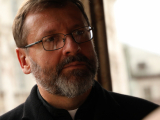 Глава УГКЦ у 153-й день війни: «Принесімо наш біль перед Боже обличчя і будьмо певні, що Він нас вислухає»
Глава УГКЦ у 153-й день війни: «Принесімо наш біль перед Боже обличчя і будьмо певні, що Він нас вислухає»
-
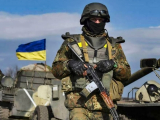 Глава УГКЦ у 152-й день війни: «Помолімся молитву заступництва за наших воїнів»
Глава УГКЦ у 152-й день війни: «Помолімся молитву заступництва за наших воїнів»
-
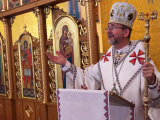 «Віруюча людина не може бути байдужою, коли бачить страждання іншої людини», – владика Богдан Дзюрах
«Віруюча людина не може бути байдужою, коли бачить страждання іншої людини», – владика Богдан Дзюрах
-
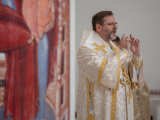 «Серед нашого страждання творімо простір для прояву Божої всемогутності», – Глава УГКЦ у 6-ту неділю після П’ятдесятниці
«Серед нашого страждання творімо простір для прояву Божої всемогутності», – Глава УГКЦ у 6-ту неділю після П’ятдесятниці
-
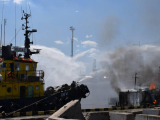 Глава УГКЦ у 151-й день війни: «Російське віроломство ми перемагаємо силою любові до нашої Батьківщини»
Глава УГКЦ у 151-й день війни: «Російське віроломство ми перемагаємо силою любові до нашої Батьківщини»

